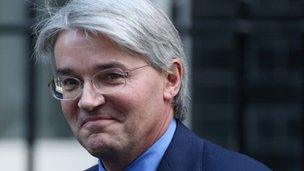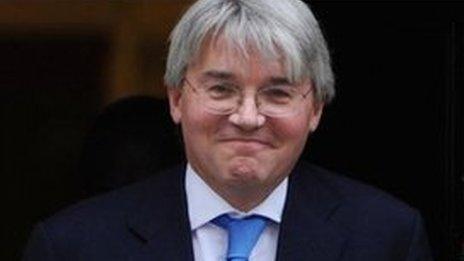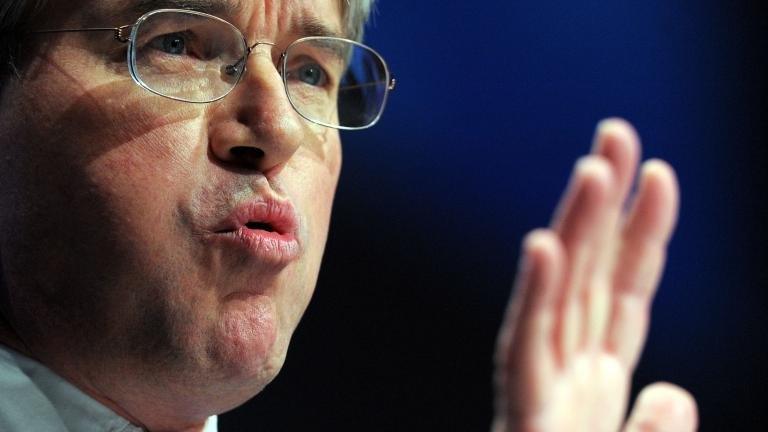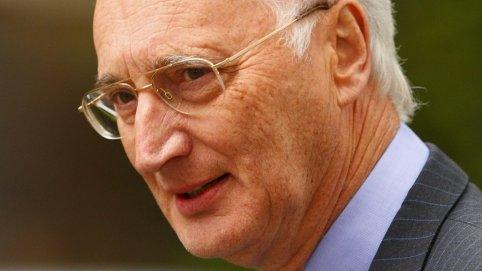Andrew Mitchell: PM accused of weak leadership
- Published

Mr Mitchell had been promoted to chief whip in September's Cabinet reshuffle
Labour has accused David Cameron of weak leadership for failing to dismiss Andrew Mitchell as government chief whip before his resignation.
The Tory MP admitted swearing at officers during a Downing Street confrontation but denied calling them "plebs".
He told the prime minister, who had stood by him, that "damaging publicity" meant he could no longer do his job.
Former Commons leader Sir George Young is to become the new chief whip.
Michael Dugher, the shadow minister without portfolio, said the episode would damage the PM.
He said: "David Cameron's complete refusal to act and refusal to take this seriously, I think, has left him looking completely weak, but also totally out of touch.
"It's looked, once again, like it's one rule for ministers and one rule for everyone else."
But Education Secretary Michael Gove defended Mr Cameron, saying one of the reasons he was an "outstanding leader" was because he "believes in backing those who work for him".
"He is not someone who, at the first whiff of trouble, abandons those who have pledged their loyalty to him," he said.
Mr Mitchell's resignation on Friday evening had been sought by the Police Federation as well as Labour.
'Very sorry'
It marked the end of a 25-year political career for the Sutton Coldfield MP, who was promoted from international development secretary to chief whip in September's cabinet reshuffle.
In his resignation letter, Mr Mitchell, 56, said: "It has become clear to me that whatever the rights and wrongs of the matter I will not be able to fulfil my duties as we both would wish."
He repeats his "categorical assurance" that he did not call police officers "plebs" - as alleged in a police report on the incident.
But he adds: "The offending comment and the reason for my apology to the police was my parting remark 'I thought you guys were supposed to f***ing help us'.
"It was obviously wrong of me to use such bad language and I am very sorry about it and grateful to the police officer for accepting my apology."
Mr Mitchell - whose job was to maintain discipline on the Conservative benches - was thrust into the spotlight when The Sun accused him in a front page story of calling police "plebs".
His outburst came after armed police stopped him from cycling through the main Downing Street gate, instead directing him to the smaller pedestrian gate.
He is reported to have used foul language and told an officer to "learn your place" and "you don't run this government".
The officer concerned reported the incident to his superiors and the official police log, which appeared to contradict Mr Mitchell's story, was later leaked to the media.
'Hugely exaggerated'
Mr Mitchell came under intense pressure from the Police Federation - which represents rank-and-file officers - and which refused to accept his version of events.
The MP stayed away from the Conservative Party conference in an attempt to defuse the row.
His fate is believed to have been sealed on Wednesday, when deputy chief whip John Randall reportedly had to be talked out of quitting in protest at his determination to cling on.
In his letter of reply to Mr Mitchell, Mr Cameron said he "understood" why he was resigning, adding: "I regret this has become necessary."
BBC political editor Nick Robinson said the chief whip "fell victim to his past behaviour, with too few people prepared to defend him, the tough guy paid for just being too tough".
Paul McKeever, chairman of the Police Federation of England and Wales, said: "It is not good to see anyone fall from public office but the decision by the prime minister to accept Andrew Mitchell's resignation seemed almost inevitable."
Tory MP Jacob Rees-Mogg said the incident had been "hugely exaggerated".
"Somebody lost his temper. Frankly, big deal. All sorts of people lose their temper in their daily lives, it's part of human nature," he told BBC's Newsnight.
- Published20 October 2012
- Published27 November 2014

- Published19 October 2012

- Published20 October 2012

- Published1 December 2013
